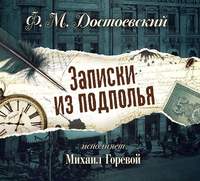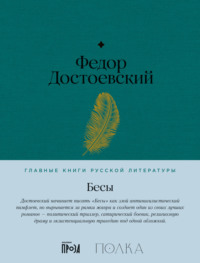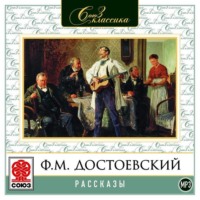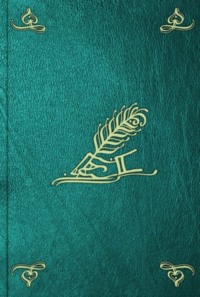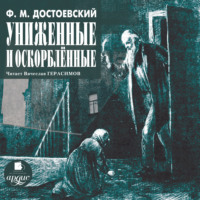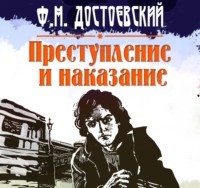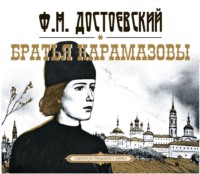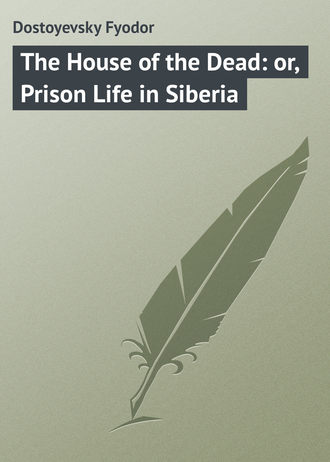 полная версия
полная версияThe House of the Dead: or, Prison Life in Siberia
The convict prison had not at first for me the significance it was afterwards to assume. I was at first, in spite of my attention, unable to understand many facts which were staring me in the face. I was naturally first struck by the most salient points, but I saw them from a false point of view, and the only impression they made upon me was one of unmitigated sadness. What contributed above all to this result was my meeting with A – f, the convict who had come to the prison before me, and who had astonished me in such a painful manner during the first few days. The effect of his baseness was to aggravate my moral suffering, already sufficiently cruel. He offered the most repulsive example of the kind of degradation and baseness to which a man may fall when all feeling of honour has perished within him. This young man of noble birth – I have spoken of him before – used to repeat to the Major all that was done in the barracks, and in doing so through the Major's body-servant Fedka. Here is the man's history.
Arrived at St. Petersburg before he had finished his studies, after a quarrel with his parents, whom his life of debauchery had terrified, he had not shrunk for the sake of money from doing the work of an informer. He did not hesitate to sell the blood of ten men in order to satisfy his insatiable thirst for the grossest and most licentious pleasures. At last he became so completely perverted in the St. Petersburg taverns and houses of ill-fame, that he did not hesitate to take part in an affair which he knew to be conceived in madness – for he was not without intelligence. He was condemned to exile and ten years' hard labour in Siberia. One might have thought that such a frightful blow would have shocked him, that it would have caused some reaction and brought about a crisis; but he accepted his new fate without the least confusion. It did not frighten him; all that he feared in it was the necessity of working, and of giving up for ever his habits of debauchery. The name of convict had no effect but to prepare him for new acts of baseness, and more hideous villainies than any he had previously perpetrated.
"I am now a convict, and can crawl at ease, without shame."
That was the light in which he looked upon his new position. I think of this disgusting creature as of some monstrous phenomenon. During the many years I have lived in the midst of murderers, debauchees, and proved rascals, never in my life did I meet a case of such complete moral abasement, determined corruption, and shameless baseness. Among us there was a parricide of noble birth. I have already spoken of him; but I could see by several signs that he was much better and more humane than A – f. During the whole time of my punishment, he was never anything more in my eyes than a piece of flesh furnished with teeth and a stomach, greedy for the most offensive and ferocious animal enjoyments, for the satisfaction of which he was ready to assassinate anyone. I do not exaggerate in the least; I recognised in A – f one of the most perfect specimens of animality, restrained by no principles, no rule. How much I was disgusted by his eternal smile! He was a monster – a moral Quasimodo. He was at the same time intelligent, cunning, good-looking, had received some education, and possessed a certain capacity. Fire, plague, famine, no matter what scourge, is preferable to the presence of such a man in human society. I have already said that in the convict prison espionage and denunciation flourished as the natural product of degradation, without the convicts thinking much of it. On the contrary, they maintained friendly relations with A – f. They were more affable with him than with any one else. The kindly attitude towards him of our drunken friend, the Major, gave him a certain importance, and even a certain worth in the eyes of the convicts. Later on, this cowardly wretch ran away with another convict and the soldier in charge of them; but of this I shall speak in proper time and place. At first, he hung about me, thinking I did not know his history. I repeat that he poisoned the first days of my imprisonment so as to drive me nearly to despair. I was terrified by the mass of baseness and cowardice in the midst of which I had been thrown. I imagined that every one else was as foul and cowardly as he. But I made a mistake in supposing that every one resembled A – f.
During the first three days I did nothing but wander about the convict prison, when I did not remain stretched out on my camp-bedstead. I entrusted to a prisoner of whom I was sure, the piece of linen which had been delivered to me by the administration, in order that he might make me some shirts. Always on the advice of Akim Akimitch, I got myself a folding mattress. It was in felt, covered with linen, as thin as a pancake, and very hard to any one who was not accustomed to it. Akim Akimitch promised to get me all the most essential things, and with his own hands made me a blanket out of a piece of old cloth, cut and sewn together from all the old trousers and waistcoats which I had bought from various prisoners. The clothes delivered to them, when they have been worn the regulation time, become the property of the prisoners. They at once sell them, for however much worn an article of clothing may be, it always possesses a certain value. I was very much astonished by all this, above all at the outset, during my first relations with this world. I became as low as my companions, as much a convict as they. Their customs, their habits, their ideas influenced me thoroughly, and externally became my own, without affecting my inner self. I was astonished and confused as though I had never heard or suspected anything of the kind before, and yet I knew what to expect, or at least what had been told me. The thing itself, however, produced on me a different impression from the mere description of it. How could I suppose, for instance, that old rags possessed still some value? And, nevertheless, my blanket was made up entirely of tatters. It would be difficult to describe the cloth out of which the clothes of the convicts were made. It was like the thick, gray cloth manufactured for the soldiers, but as soon as it had been worn some little time it showed the threads and tore with abominable ease. The uniform ought to have lasted for a whole year, but it never went so long as that. The prisoner labours, carries heavy burdens, and the cloth naturally wears out, and gets into holes very quickly. Our sheepskins were intended to be worn for three years. During the whole of that time they served as outer garments, blankets, and pillows, but they were very solid. Nevertheless, at the end of the third year, it was not rare to see them mended with ordinary linen. Although they were now very much worn, it was always possible to sell them at the rate of forty kopecks a piece, the best preserved ones even at the price of sixty kopecks, which was a great sum for the convict prison.
Money, as I have before said, has a sovereign value in such a place. It is certain that a prisoner who has some pecuniary resources suffers ten times less than the one who has nothing.
"When the Government supplies all the wants of the convict, what need can he have for money?" reasoned our chief.
Nevertheless, I repeat that if the prisoners had been deprived of the opportunity of possessing something of their own, they would have lost their reason, or would have died like flies. They would have committed unheard-of crimes; some from wearisomeness or grief, the others, in order to get sooner punished, and, according to their expression, "have a change." If the convict who has gained some kopecks by the sweat of his brow, who has embarked in perilous undertakings in order to conquer them, if he spends this money recklessly, with childish stupidity, that does not the least in the world prove that he does not know its value, as might at first sight be thought. The convict is greedy for money, to the point of losing his reason, and, if he throws it away, he does so in order to procure what he places far above money – liberty, or at least a semblance of liberty.
Convicts are great dreamers; I will speak of that further on with more detail. At present I will confine myself to saying that I have heard men, who had been condemned to twenty years' hard labour, say, with a quiet air, "when I have finished my time, if God wishes, then – " The very words hard labour, or forced labour, indicate that the man has lost his freedom; and when this man spends his money he is carrying out his own will.
In spite of the branding and the chains, in spite of the palisade which hides from his eyes the free world, and encloses him in a cage like a wild beast, he can get himself spirits and other delights; sometimes even (not always), corrupt his immediate superintendents, the old soldiers and non-commissioned officers, and get them to close their eyes to his infractions of discipline within the prison. He can, moreover – what he adores – swagger; that is to say, impress his companions and persuade himself for a time, that he enjoys more liberty than he really possesses. The poor devil wishes, in a word, to convince himself of what he knows to be impossible. This is why the prisoners take such pleasure in boasting and exaggerating in burlesque fashion their own unhappy personality.
Finally, they run some risk when they give themselves up to this boasting; in which again they find a semblance of life and liberty – the only thing they care for. Would not a millionaire with a rope round his neck give all his millions for one breath of air? A prisoner has lived quietly for several years in succession, his conduct has been so exemplary that he has been rewarded by special exemptions. Suddenly, to the great astonishment of his chiefs, this man becomes mutinous, plays the very devil, and does not recoil from a capital crime such as assassination, violation, etc. Every one is astounded at the cause of this unexpected explosion on the part of a man thought incapable of such a thing. It is the convulsive manifestation of his personality, an instinctive melancholia, an uncontrollable desire for self-assertion, all of which obscures his reason. It is a sort of epileptic attack, a spasm. A man buried alive who suddenly wakes up must strike in a similar manner against the lid of his coffin. He tries to rise up, to push it from him, although his reason must convince him of the uselessness of his efforts.
Reason, however, has nothing to do with this convulsion. It must not be forgotten that almost every voluntary manifestation on the part of a convict is looked upon as a crime. Accordingly, it is a perfect matter of indifference to them whether this manifestation be important or insignificant, debauch for debauch, danger for danger. It is just as well to go to the end, even as far as a murder. The only difficulty is the first step. Little by little the man becomes excited, intoxicated, and can no longer contain himself. For that reason it would be better not to drive him to extremities. Everybody would be much better for it.
But how can this be managed?
CHAPTER VII. THE FIRST MONTH (continued)
When I entered the convict prison I possessed a small sum of money; but I carried very little of it about with me, lest it should be confiscated. I had gummed some banknotes into the binding of my New Testament – the only book authorised in the convict prison. This New Testament had been given to me at Tobolsk, by a person who had been exiled some dozens of years, and who had got accustomed to see in other "unfortunates" a brother.
There are in Siberia people who pass their lives in giving brotherly assistance to the "unfortunates." They feel the same sympathy for them that they would have for their own children. Their compassion is something sacred and quite disinterested. I cannot help here relating in some words a meeting which I had at this time.
In the town where we were then imprisoned lived a widow, Nastasia Ivanovna. Naturally, none of us were in direct relations with this woman. She had made it the object of her life to come to the assistance of all the exiles; but, above all, of us convicts. Had there been some misfortune in her family? Had some person dear to her undergone a punishment similar to ours? I do not know. In any case, she did for us whatever she could. It is true she could do very little, for she was very poor. But we felt when we were shut up in the convict prison that, outside, we had a devoted friend. She often brought us news, which we were very glad to hear, for nothing of the kind reached us.
When I left the prison to be taken to another town, I had the opportunity of calling upon her and making her acquaintance. She lived in one of the suburbs, at the house of a near relation.
Nastasia Ivanovna was neither old nor young, neither pretty nor ugly. It was difficult, impossible even, to know whether she was intelligent and well-bred. But in her actions could be seen infinite compassion, an irresistible desire to please, to solace, to be in some way agreeable. All this could be read in the sweetness of her smile.
I passed an entire evening at her house, with other companions of my imprisonment. She looked us straight in the face, laughed when we laughed, did everything we asked her, in conversation was always of our opinion, and did her best in every way to entertain us. She gave us tea and various little delicacies. If she had been rich we felt sure she would have been pleased, if only to be able to entertain us better and offer for us some solid consolation.
When we wished her "good-bye," she gave us each a present of a cardboard cigar-case as a souvenir. She had made them herself – Heaven knows how – with coloured paper, the paper with which school-boys' copy-books are covered. All round this cardboard cigar-case she had gummed, by way of ornamentation, a thin edge of gilt paper.
"As you smoke, these cigar-cases will perhaps be of use to you," she said, as if excusing herself for making such a present.
There are people who say, as I have read and heard, that a great love for one's neighbour is only a form of selfishness. What selfishness could there be in this? That I could never understand.
Although I had not much money when I entered the convict prison, I could not nevertheless feel seriously annoyed with convicts who, immediately on my arrival, after having deceived me once, came to borrow of me a second, a third time, and even oftener. But I admitted frankly that what did annoy me was the thought that all these people, with their smiling knavery, must take me for a fool, and laugh at me just because I lent the money for the fifth time. It must have seemed to them that I was the dupe of their tricks and their deceit. If, on the contrary, I had refused them and sent them away, I am certain that they would have had much more respect for me. Still, though it vexed me very much, I could not refuse them.
I was rather anxious during the first days to know what footing I should hold in the convict prison, and what rule of conduct I should follow with my companions. I felt and perfectly understood that the place being in every way new to me, I was walking in darkness, and it would be impossible for me to live for ten years in darkness. I decided to act frankly, according to the dictates of my conscience and my personal feeling. But I also knew that this decision might be very well in theory, and that I should, in practice, be governed by unforeseen events. Accordingly, in addition to all the petty annoyances caused to me by my confinement in the convict prison, one terrible anguish laid hold of me and tormented me more and more.
"The dead-house!" I said to myself when night fell, and I looked from the threshold of our barracks at the prisoners just returned from their labours and walking about in the court-yard, from the kitchen to the barracks, and vice versâ. As I examined their movements and their physiognomies I endeavoured to guess what sort of men they were, and what their disposition might be.
They lounged about in front of me, some with lowered brows, others full of gaiety – one of these expressions was seen on every convict's face – exchanged insults or talked on indifferent matters. Sometimes, too, they wandered about in solitude, occupied apparently with their own reflections; some of them with a worn-out, pathetic look, others with a conceited air of superiority. Yes, here, even here! – their cap balanced on the side of their head, their sheepskin coat picturesquely over the shoulder, insolence in their eyes and mockery on their lips.
"Here is the world to which I am condemned, in which, in spite of myself, I must somehow live," I said to myself.
I endeavoured to question Akim Akimitch, with whom I liked to take my tea, in order not to be alone, for I wanted to know something about the different convicts. In parenthesis I must say that the tea, at the beginning of my imprisonment, was almost my only food. Akim Akimitch never refused to take tea with me, and he himself heated our tin tea-urns, made in the convict prison and let out to me by M – .
Akim Akimitch generally drank a glass of tea (he had glasses of his own) calmly and silently, then thanked me when he had finished, and at once went to work on my blanket; but he had not been able to tell me what I wanted to know, and did not even understand my desire to know the dispositions of the people surrounding me. He listened to me with a cunning smile which I have still before my eyes. No, I thought, I must find out for myself; it is useless to interrogate others.
The fourth day, the convicts were drawn up in two ranks, early in the morning, in the court-yard before the guard-house, close to the prison gates. Before and behind them were soldiers with loaded muskets and fixed bayonets.
The soldier has the right to fire on the convict if he tries to escape. But, on the other hand, he is answerable for his shot, if there was no absolute necessity for him to fire. The same thing applies to revolts. But who would think of openly taking to flight?
The Engineer officer arrived accompanied by the so-called "conductor" and by some non-commissioned officers of the Line, together with sappers and soldiers told off to superintend the labours of the convicts.
The roll was called. Then the convicts who were going to the tailors' workshop started first. These men worked inside the prison, and made clothes for all the inmates. The other exiles went into the outer workshops, until at last arrived the turn of the prisoners destined for field labour. I was of this number – there were altogether twenty of us. Behind the fortress on the frozen river were two barges belonging to the Government, which were not worth anything, but which had to be taken to pieces in order that the wood might not be lost. The wood was in itself all but valueless, for firewood can be bought in the town at a nominal price. The whole country is covered with forests.
This work was given to us in order that we might not remain with our arms crossed. This was understood on both sides. Accordingly, we went to it apathetically; though just the contrary happened when work had to be done, which would be profitable, or when a fixed task was assigned to us. In this latter case, although prisoners were to derive no profit from their work, they tried to get it over as soon as possible, and took a pride in doing it quickly. When such work as I am speaking of had to be done as a matter of form, rather than because it was necessary, task work could not be asked for. We had to go on until the beating of the drum at eleven o'clock called back the convicts.
The day was warm and foggy, the snow was on the point of melting. Our entire band walked towards the bank behind the fortress, shaking lightly their chains hid beneath their garments: the sound came forth clear and ringing. Two or three convicts went to get their tools from the dépôt.
I walked on with the others. I had become a little animated, for I wanted to see and know in what this field labour consisted, to what sort of work I was condemned, and how I should do it for the first time in my life.
I remember the smallest particulars. We met, as we were walking along, a townsman with a long beard, who stopped and slipped his hand into his pocket. A prisoner left our party, took off his cap and received alms – to the extent of five kopecks – then came back hurriedly towards us. The townsman made the sign of the cross and went his way. The five kopecks were spent the same morning in buying cakes of white bread which were shared equally among us. In my squad some were gloomy and taciturn, others indifferent and indolent. There were some who talked in an idle manner. One of these men was extremely gay, heaven knows why. He sang and danced as we went along, shaking and ringing his chains at each step. This fat and corpulent convict was the very one who, on the very day of my arrival during the general washing, had a quarrel with one of his companions about the water, and had ventured to compare him to some sort of bird. His name was Scuratoff. He finished by shouting out a lively song of which I remember the burden:
They married me without my consent,
When I was at the mill.
Nothing was wanting but a balalaika [the Russian banjo].
His extraordinary good-humour was justly reproved by several of the prisoners, who were offended by it.
"Listen to his hallooing," said one of the convicts, "though it doesn't become him."
"The wolf has but one song; this Tuliak [inhabitant of Tula] is stealing it from him," said another, who could be recognised by his accent as a Little Russian.
"Of course I am from Tula," replied Scuratoff; "but we don't stuff ourselves to bursting as you do in your Pultava."
"Liar! what did you eat yourself? Bark shoes and cabbage soup?"
"You talk as if the devil fed you on sweet almonds," broke in a third.
"I admit, my friend, that I am an effeminate man," said Scuratoff with a gentle sigh, as though he were really reproaching himself for his effeminacy. "From my most tender infancy I was brought up in luxury, fed on plums and delicate cakes. My brothers even now have a large business at Moscow. They are wholesale dealers in the wind that blows; immensely rich men, as you may imagine."
"And what did you sell?"
"I was very successful, and when I received my first two hundred – "
"Roubles? impossible!" interrupted one of the prisoners, struck with amazement at hearing of so large a sum.
"No, my good fellow, not two hundred roubles, two hundred blows of the stick. Luka; I say Luka!"
"Some have the right to call me Luka, but for you I am Luka Kouzmitch," replied rather ill-temperedly a small, feeble convict with a pointed nose.
"The devil take you, you are really not worth speaking to; yet I wanted to be civil to you. But to continue my story; this is how it happened that I did not remain any longer at Moscow. I received my fifteen last strokes and was then sent off, and was at – "
"But what were you sent for?" asked a convict who had been listening attentively.
"Don't ask stupid questions. I was explaining to you how it was I did not make my fortune at Moscow; and yet how anxious I was to be rich, you could scarcely imagine how much."
Many of the prisoners began to laugh. Scuratoff was one of those lively persons, full of animal spirits, who take a pleasure in amusing their graver companions, and who, as a matter of course, received no reward except insults. He belonged to a type of men, to whose characteristics I shall, perhaps, have to return.
"And what a fellow he is now!" observed Luka Kouzmitch. "His clothes alone must be worth a hundred roubles."
Scuratoff had the oldest and greasiest sheepskin that could be seen. It was mended in many different places with pieces that scarcely hung together. He looked at Luka attentively from head to foot.
"It is my head, friend," he said, "my head that is worth money. When I took farewell of Moscow, I was half consoled, because my head was to make the journey on my shoulders. Farewell, Moscow, I shall never forget your free air, nor the tremendous flogging I got. As for my sheepskin, you are not obliged to look at it."
"You would like me, perhaps, to look at your head?"
"If it was really his own natural property, but it was given him in charity," cried Luka Kouzmitch. "It was a gift made to him at Tumen, when the convoy was passing through the town."
"Scuratoff, had you a workshop?"


